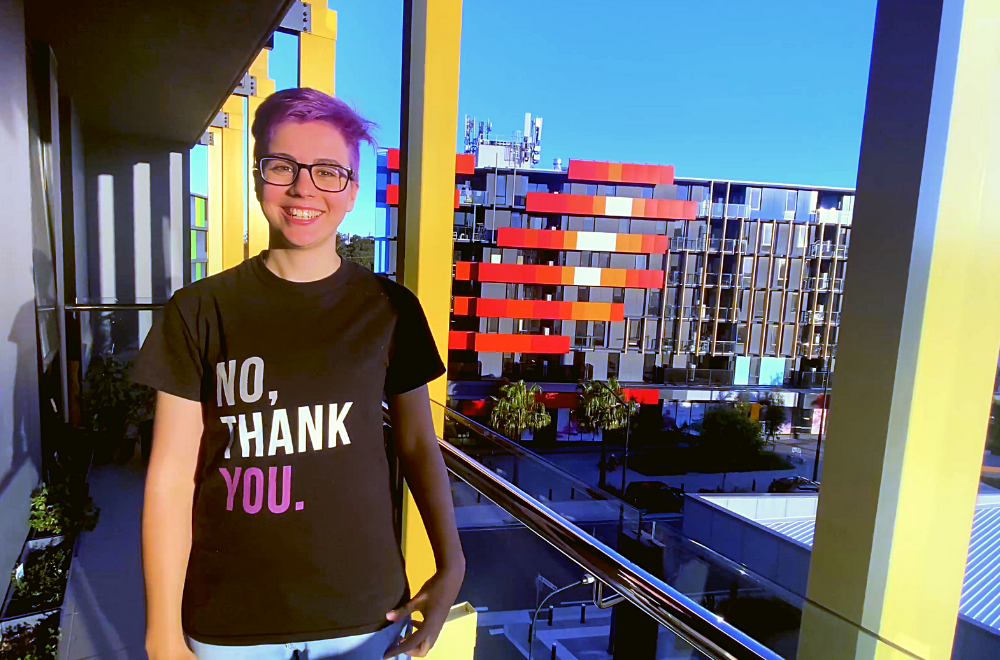When J. Dumbrell (JD) left high school, like most of their friends, they had no idea what they wanted to do. After trying their hand at engineering, reaching out to the staff at Griffith, and taking some years off, JD returned to university with a new career in mind – psychology.
After working for three years, then travelling with the money they had saved, JD realised that no matter where they were or what they were doing, their thoughts and conversations always came back to psychology.
“I already knew how supportive and approachable the staff were at Griffith, so if I was going to return to tertiary study, my choice of university was a no-brainer,” JD says.
“I was still quite unsure what I wanted to do as a professional, but when I heard I could start studying Psychology in Trimester 3, I thought I’d give it a try. If anyone is considering starting study in Trimester 3, I couldn’t recommend it more! The classes were smaller, and the lecturers and tutors were passionate about helping us. There was even more support offered to me than the first time I was at Griffith, which really helped me feel welcome and in the right place, as well as succeed academically.”
Despite this support, JD noticed something was missing in their time on-campus. As sexual and gender diversity was a very prominent part of their life (identifying as asexual since 16, and exploring their gender since 22) they were surprised by the lack of LGBTQIA+ student engagement.
Initially, they assumed this was because of the trimester three start date, but when they didn’t see a queer club at the Gold Coast Campus Trimester 1 Orientation Week, JD decided to contact the Student Guild.
“Next thing I knew, I was running a “Griffith Equality” stall at the Club Sign-on Week and chatting with the current Student Representative for the Griffith Pride Committee,” JD explains.

“I founded the club and applied to join the Pride Committee because of the same two values that attracted me to Psychology: inclusion and communication. As university is often the first time that people explore who they are, I believe that sexuality and gender should not only be accepted and included in university life, but also celebrated, explored, experimented with and discussed freely.
“I know that there is some work that needs to go into achieving this goal, so for the time being, my aim is to provide my fellow students with a designated safe space to discuss sexual and gender diversity, regardless of their orientation and identity.”
JD offers some advice to students who are unsure of what to study: take the time to discover the things that drive you.
“I’ve learnt first-hand why everyone says to study something you’re passionate about,” JD says.
“Of course, I was told this since high school, and I thought that’s what I had been doing, but there’s a difference between something you like and something you’re passionate about. The tell-tale sign may be different for everyone, but for me, it’s that it gives me energy.

“I’ve battled with chronic tiredness (later diagnosed as depression) and I know how unmotivated that can make me feel. If you have experienced something similar, my advice would be to take a long break, focus on the things that give you energy and increase their presences in your life. They don’t have to do with study, they don’t even have to do with anything that’s “productive”. If watching Netflix gives you energy, I say go for it! Focus on that energy, and in time, you’ll find why that gives you energy. Once you know that, you can use it to your advantage.
“If you feel like that’s not working, reach out. Griffith has a lot of support options available, and they’re eager to help you, all you need to do is ask.
“My fellow classmates, and all the staff I have talked with, are all very friendly, approachable, and happy to help me with my studies. There are so many opportunities for support at Griffith! I’ve been able to get more time on my exams with the disability support team, work through my anxiety with the counsellors, and even get club support with the Student Guild.
“Being a leader for Griffith Equality has helped me in my studies too. It’s a position that I never imagined for myself, but it’s given me plenty of practice to develop my team-working and communication skills. This has given me an insight in to how I might like to work after I graduate, which has fuelled my motivation to study and helped me stay focused. I’d definitely recommend it for other students.
“All of this, and the other support I’ve had from Griffith, has given me a lot of confidence to continue my studies, and to strive to help others in my future career.”
If like JD you have a passion to help others through inclusion, communication and psychology, find out more about your study options on the Griffith University website.



